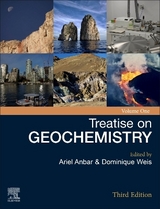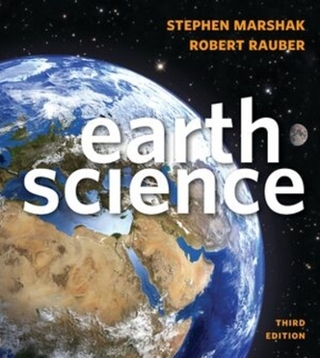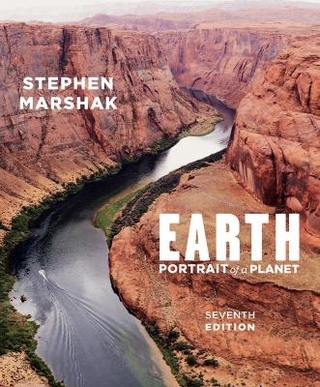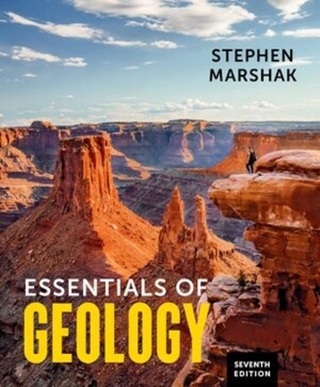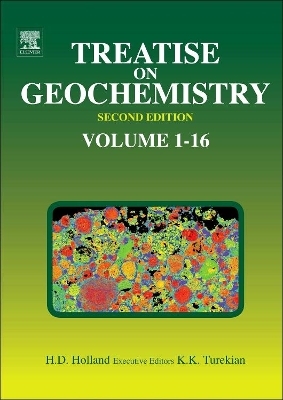
Treatise on Geochemistry
Elsevier Science Ltd
978-0-08-095975-7 (ISBN)
- Titel erscheint in neuer Auflage
- Artikel merken
This extensively updated new edition of the widely acclaimed Treatise on Geochemistry has increased its coverage beyond the wide range of geochemical subject areas in the first edition, with five new volumes which include: the history of the atmosphere, geochemistry of mineral deposits, archaeology and anthropology, organic geochemistry and analytical geochemistry. In addition, the original Volume 1 on "Meteorites, Comets, and Planets" was expanded into two separate volumes dealing with meteorites and planets, respectively. These additions increased the number of volumes in the Treatise from 9 to 15 with the index/appendices volume remaining as the last volume (Volume 16). Each of the original volumes was scrutinized by the appropriate volume editors, with respect to necessary revisions as well as additions and deletions. As a result, 27% were republished without major changes, 66% were revised and 126 new chapters were added.
KARL KAREKIN TUREKIAN (1927–2013) Karl Turekian was a man of remarkable scientific breadth, with innumerable important contributions to marine geochemistry, atmospheric chemistry, cosmochemistry, and global geochemical cycles. He was mentor to a long list of students, postdocs, and faculty (at Yale and elsewhere), a leader in geochemistry, a prolific author and editor, and had a profound influence in shaping his department at Yale University. In 1949 Karl joined a graduate program in the new field of geochemistry at Columbia University under Larry Kulp with students Dick Holland and his fellow Wheaton alums Wally Broecker and Paul Gast. This was a propitious time as Columbia’s Lamont Geological Observatory had only been established a few years beforehand. It was during these years that Karl began to acquire the skills that led to his rapid emergence as a leader in geochemistry. After a brief postdoc at Columbia, Karl accepted a position as Assistant Professor of Geology at Yale University in 1956, where he set out to create a program in geochemistry from scratch. Karl spent the rest of his life on the Yale faculty and was immersed in geochemistry to the end. He was deeply involved in editing this edition of the massive Treatise on Geochemistry, which has grown to 15 volumes, until only a month before his passing away on 15 March 2013. Karl turned to the study of deep-sea cores and especially the analysis of trace elements to study the wide variety of geochemical processes that are recorded there. His work with Hans Wedepohl in writing and tabulating the Handbook of Geochemistry (Turekian, 1969) was a major accomplishment and this work was utilized by many generations of geochemists. Teaming up with his graduate students and in association with Paul Gast, he developed a mass spectrometry lab at Yale and began to thoroughly investigate the Rb–Sr isotopic systematics of deep-sea clays, not only as repositories but also as sites for exchange to occur and serve as a control of the geochemistry of ocean water. Karl was a major player in a revolutionary marine geochemistry campaign known as the Geochemical Ocean Section Study (GEOSECS). GEOSECS was part of the International Decade of Ocean Exploration in the 1970s, and it took aim at measuring and understanding the distribution of geochemical tracers for circulation and biogeochemistry in the world’s oceans.. It was also within this same time period that another large-scale ‘geochemical’ sampling program known as Apollo 11 came along. Here Karl utilized his INAA techniques to examine some of the first returned lunar samples for their trace elements. Karl was particularly proud of being the holder of the Silliman Chair and being curator of the Yale meteorite collection. In a continuation of Karl’s foray into cosmochemistry, Andy Davis came to Yale to study with Karl and Sydney Clark. Equally important to the legacy of what Karl did for science in his research contributions on and across the planet was his influence on scientists. His legendary daily coffee hours were a training ground for many generations of students, postdocs, and visitors, as well as a proving ground for Karl’s own ideas. He had a great love for vigorous scientific debate. Karl loved to question and be questioned. Nothing was sacred and, in the act of questioning as in exploring, new science arises. He was extraordinarily supportive of people, always had time to discuss and listen, and helped everyone from students to his fellow faculty at Yale. Karl was twice department chair and even when not chair, a steadying influence in times of departmental difficulty. Andrew M. Davis, Lawrence Grossman and Albert S. Colman University of Chicago, Chicago, IL, USA Mark H. Thiemens University of California at San Diego, La Jolla, CA, USA This Obituary was first published in PNAS, Vol. 110, No. 41, 16290–16291, 10th October 2013 © 2013 Proceedings of the National Academy of Sciences of the United States and is reproduced with permission. HEINRICH DIETER HOLLAND (1927–2012) Heinrich Dieter ‘Dick’ Holland, who died on 21 May 2012, was responsible for major advances across several fields of geochemistry. He was born on 27 May 1927 and died just short of his 85th birthday. Dick was 19 years old when he graduated from Princeton. After a stint of about a year in the US army with subsequent naturalization, he was drawn to Columbia University to start a career in geochemistry. While Dick was working on his thesis at Columbia, he was recruited in 1950 by Harry Hess, the new chairman of the Princeton geology department, to start a new program in geochemistry at Princeton. Dick ultimately received his PhD in 1952 from Columbia, where he studied the distribution of uranium daughter nuclides in seawater and, to a lesser extent, in sediments, rocks, and minerals as part of an effort to date these materials. At Princeton, Dick was very interested early on in the interactions of the atmosphere, Earth’s surface, and the oceans and history of the atmosphere. Along the way, he also attacked such problems as the distribution of trace elements between aqueous systems (i.e., the ocean) and calcium carbonate, a common deposit of marine organisms, with the hope of using such partitioning as an index of the temperature of precipitation. In the past few years, this work has seen fruition in the study of strontium in corals as temperature indicators of contemporary oceans and has been extended to the past. Dick’s interest in deciphering the history of the oceans and the atmosphere over eons of Earth time resulted in several substantive articles and two fundamental books: The Chemistry of the Atmosphere, Rivers and Oceans (1978) and The Chemical Evolution of the Atmosphere and Oceans (1984). He continued this interest up to his latest days. He wrote a fundamental essay, ‘The geologic history of seawater,’ on the subject in the Treatise on Geochemistry (2003) for which he and I acted as executive editors. We were close to completing the second edition of the treatise before he died. AGU played an important role in both editions of the treatise. The volume editors and the executive editors used get-togethers at AGU Fall Meetings in San Francisco, CA, to gradually bring the treatise to completion. Dick was also one of the earliest explorers of oceanic ridges, searching for hydrothermal activity associated with the expected spreading centers predicted by the geological and geophysical study of these ridges. Dick was president of the Geochemical Society from 1970 to 1971. In 1994, he received the V. M. Goldschmidt Medal and Award, the society’s highest recognition. In 1995, he was awarded the Penrose Gold Medal of the Society of Economic Geologists, and in 1998 he was awarded the Leopold von Buch Medal by the German Geological Society. Dick was a member of the US National Academy of Sciences and a fellow of the American Academy of Arts and Sciences. He retired from Harvard in 2000 but stayed on there, continuing his research until 2006, when he left for Philadelphia, PA, to be close to some members of his family. There he took up the position of visiting research scientist at the University of Pennsylvania. On his retirement from Harvard in 2000, a symposium in his honor was held. The participants included many of the people he had influenced during his long career at Princeton and Harvard. Perhaps the greatest recognition for Dick was not the many honors he received from learned societies but the extraordinary achievements of his many students and postdocs for whom he was an enormous influence. Karl K. Turekian, Yale University, New Haven, CT, USA (extracted from Eos, Vol. 93, No. 34, 21 August 2012 © 2012 American Geophysical Union)
Meteorites and Cosmochemical Processes
Planets, Asteroids, Comets and the Solar System
The Mantle and Core
The Crust
The Atmosphere
The History of the Atmosphere
Surface and Ground Water, Weathering, and Soils
The Oceans and Marine Geochemistry
Sediments, Diagenesis and Sedimentary Rocks
Mineral Deposits
Organic Geochemistry
Biogeochemistry
Environmental Geochemistry
Archaeology and Anthropology
Analytical Geochemistry
| Mitarbeit |
Chef-Herausgeber: Karl K. Turekian, Heinrich D. Holland |
|---|---|
| Verlagsort | Oxford |
| Sprache | englisch |
| Maße | 216 x 279 mm |
| Gewicht | 1880 g |
| Themenwelt | Naturwissenschaften ► Geowissenschaften ► Geologie |
| Naturwissenschaften ► Geowissenschaften ► Mineralogie / Paläontologie | |
| ISBN-10 | 0-08-095975-X / 008095975X |
| ISBN-13 | 978-0-08-095975-7 / 9780080959757 |
| Zustand | Neuware |
| Haben Sie eine Frage zum Produkt? |
aus dem Bereich
